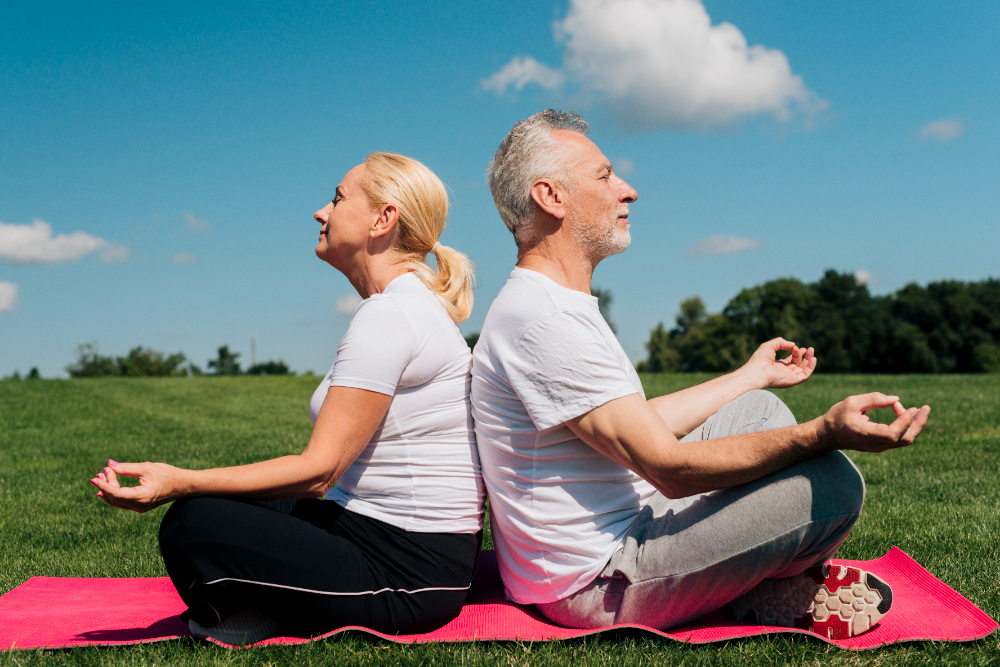Good sleep is more than just a pleasure—it’s a fundamental pillar of physical, mental, and emotional health. However, after age 50, many people notice that the quality of their sleep decreases. What was once a night of restful, uninterrupted sleep can become fragmented and less refreshing.
This is not a coincidence. Factors like decreased melatonin production (the hormone that regulates sleep), changes in circadian rhythms, and, in some cases, health issues like sleep apnea or restless legs syndrome can make sleep harder to achieve. Additionally, accumulated stress or worries typical of this life stage can exacerbate the situation.
The magnitude of the problem is significant: according to a report from the National Sleep Foundation, nearly 50% of older adults experience some form of insomnia or difficulty sleeping at least a few nights per week. This doesn’t just affect their energy and daily well-being but can also negatively impact their immune system, memory, and cardiovascular health.
Fortunately, improving sleep quality at this age is possible. With a few adjustments to daily habits and the implementation of specific techniques, you can reclaim that deep and restorative rest your body needs. In this article, we’ll explore the most effective tips to achieve this.
Why Does Sleep Quality Change After Age 50?
Sleep, a vital process for health, undergoes significant changes as we age. What was once a night of deep and continuous rest can become lighter and more fragmented. These changes are influenced by physiological, emotional, and health-related factors.
1. Physiological Changes
As we age, our bodies experience transformations that directly affect sleep quality:
- Decreased melatonin production: The body produces less of this hormone responsible for regulating the sleep-wake cycle, making it harder to fall asleep and stay asleep.
- Circadian rhythm alterations: The internal body clock tends to shift earlier with age, leading many older adults to feel sleepy in the early evening and wake up before sunrise.
- Reduced deep sleep: The stages of deep sleep, essential for physical recovery and cell regeneration, tend to shorten or occur less frequently.
2. Health Issues
From age 50 onwards, certain physical conditions can interfere with restful sleep:
- Chronic pain: Conditions like arthritis or muscle pain can make it challenging to find a comfortable sleeping position.
- Sleep apnea: This disorder, characterized by pauses in breathing during sleep, becomes more common with age and disrupts deep sleep.
- Medications: Many older adults take medications to manage chronic illnesses, and some can have side effects that disrupt sleep patterns.
3. Emotional and Psychological Factors
Stress and anxiety, often related to family responsibilities, retirement transitions, or health concerns, also play a significant role in sleep quality:
- Difficulty falling asleep due to intrusive thoughts or worries.
- Frequent nighttime awakenings, making it hard to return to sleep.
- Chronic insomnia, if these issues are not managed effectively.
Healthy Habits for Restful Sleep
Improving sleep quality after age 50 doesn’t require drastic changes, just the adoption of simple and consistent habits that promote deep, restorative rest. Here are some practical tips you can easily incorporate into your daily routine:
1. Establish a Sleep Routine
Our bodies respond best to a regular schedule. Going to bed and waking up at the same time every day, even on weekends, helps regulate the internal clock and supports deeper sleep.
- Create a relaxing bedtime ritual, like reading a book, listening to soft music, or practicing mindful breathing.
- Avoid screens (phones, TVs, or tablets) at least 30 minutes before bed, as blue light interferes with melatonin production.
2. Create a Sleep-Friendly Environment
Your bedroom environment plays a crucial role in sleep quality. Ensure it’s a calm, comfortable space:
- Darkness: Use blackout curtains or eye masks to block light.
- Silence: Reduce external noises with earplugs or white noise machines if needed.
- Cool temperature: Keep the room cool, ideally between 16 and 20°C (60-68°F), for a more comfortable rest.
- Invest in a mattress and pillows that suit your needs, especially if you suffer from joint or muscle pain.
3. Limit Napping During the Day
While naps can be restorative, it’s important to moderate their duration to avoid disrupting nighttime sleep:
- If you need to rest during the day, limit naps to 20-30 minutes and avoid them after 4 p.m.
- Oversleeping during the day can reduce feelings of tiredness at night, making it harder to fall asleep.
Nutrition and Sleep: Foods and Drinks That Help (and What to Avoid)
What you eat and drink throughout the day, especially in the hours before bedtime, can significantly impact sleep quality. Some foods and drinks promote restful sleep, while others can interfere with it. Here’s what to include and what to avoid:
Foods That Promote Better Sleep
Certain nutrient-rich foods stimulate the production of melatonin and serotonin, hormones essential for regulating sleep. These are some of the best options:
- Bananas: Rich in magnesium and tryptophan, they help relax muscles and boost serotonin production.
- Almonds and walnuts: Contain natural melatonin, which supports the sleep-wake cycle, as well as magnesium.
- Relaxing teas: Beverages like chamomile, valerian, or linden tea have calming properties that help relax the body before sleep.
- Low-fat dairy products: A warm glass of milk can be comforting and helps induce sleep due to its tryptophan content.
What to Avoid Before Bedtime
Some foods and drinks can interfere with sleep if consumed too close to bedtime:
- Caffeine: Found in coffee, black tea, chocolate, and certain sodas, it can stay in your system for hours and disrupt falling asleep.
- Alcohol: While it may initially make you drowsy, it interferes with deep sleep stages, causing nighttime awakenings.
- Heavy meals: Avoid large, fatty dinners, as they can cause indigestion and discomfort, making it hard to rest.
- Refined sugars: Sugary foods can cause energy spikes and hormonal imbalances that disrupt sleep.
Find the Right Balance Before Bed
Going to bed hungry can be as disruptive as going to bed too full. If you feel hungry before sleeping, opt for a light snack like:
- A handful of almonds or walnuts.
- A plain yogurt with no added sugar.
- A relaxing herbal tea with a whole-grain cracker.
Physical Activity and Its Impact on Sleep
Regular exercise not only improves physical health but also positively impacts sleep quality. Staying active can help you fall asleep faster, enjoy deeper rest, and wake up feeling more refreshed. However, timing matters: exercising too close to bedtime can stimulate the nervous system and make it harder to relax.
How Exercise Improves Sleep
Exercise offers several sleep benefits:
- Reduces stress: Exercise releases endorphins, the “feel-good hormones,” which reduce anxiety and prepare the mind for better rest.
- Regulates circadian rhythms: Outdoor activities like walking help synchronize the body’s internal clock, promoting a stable sleep-wake cycle.
- Enhances deep sleep: Studies show that regular exercise increases the duration and quality of restorative deep sleep stages.
Ideal Activities for This Life Stage
After age 50, it’s important to choose physical activities that are effective and adaptable to your needs:
- Walking: A daily walk, especially outdoors, improves circulation, reduces stress, and prepares the body for restful sleep.
- Yoga: This practice combines physical exercise with relaxation and breathing techniques, reducing stress and promoting calm before bed.
- Swimming or water exercises: Great for joint care, these activities improve flexibility, strength, and mood with minimal physical impact.
When to Exercise
Avoid intense physical activity in the 2-3 hours before bedtime, as it may stimulate your system. Instead:
- Do more intense workouts in the morning or early afternoon.
- Reserve the evening for gentle exercises like yoga or stretching.
Relaxation Techniques to Fall Asleep
Relaxation techniques can make a significant difference in sleep quality, helping to calm the mind, reduce tension, and prepare the body for restful sleep.
1. Meditation and Mindfulness
Meditation and mindfulness are powerful tools to relax the mind and reduce stress before sleeping. These practices help you focus on the present moment, letting go of the day’s worries.
- How to do it:
- Sit or lie down comfortably and close your eyes.
- Focus on your breath, observing how the air enters and exits.
- If your mind wanders, gently bring it back to your breath.
- Guided meditations are great for beginners. Our Sensalus app offers tailored exercises to help you relax before bed.
2. Deep Breathing
Deep breathing is a simple yet effective technique to relax the nervous system and lower your heart rate.
- How to do it:
- Inhale deeply through your nose for 4 seconds.
- Hold your breath for 4 seconds.
- Exhale slowly through your mouth for 6 seconds.
- Repeat this cycle 5-10 times, feeling your body relax with each exhale.
3. Listen to Relaxing Sounds or Soft Music
Relaxing sounds can create a soothing environment for sleep, helping to quiet the mind and mask environmental noise.
- Recommended options:
- White noise: Blocks out external sounds like traffic or neighbors.
- Nature sounds: Rain, ocean waves, or birdsong are popular choices.
- Instrumental music: Soft melodies without lyrics, such as classical or ambient music.
When to Seek Professional Help
If sleep problems persist despite implementing these tips, it’s important to consider consulting a doctor or sleep specialist. Ignoring sleep issues can have negative effects on physical and mental health.
Signs You Need Professional Help
Seek help if you experience:
- Difficulty falling asleep or staying asleep for more than three nights a week over an extended period.
- Frequent nighttime awakenings that leave you feeling tired.
- Excessive daytime sleepiness, despite getting the recommended hours of sleep.
- Loud snoring or pauses in breathing during sleep, signs of sleep apnea.
- Uncomfortable sensations in your legs that make you move them constantly, a hallmark of restless legs syndrome.
Common Sleep Disorders
Certain conditions require medical attention:
- Sleep apnea: This disorder disrupts deep sleep and increases the risk of cardiovascular issues.
- Restless legs syndrome (RLS): Causes an irresistible urge to move the legs, interfering with relaxation.
- Chronic insomnia: Persistent difficulty sleeping may stem from stress, anxiety, or hormonal imbalances.
The Importance of Seeking Help
A specialist can:
- Identify the underlying causes of sleep issues.
- Conduct sleep studies to diagnose specific disorders.
- Suggest treatments ranging from lifestyle changes to therapies like CPAP for apnea or medication for severe cases.
Conclusion
Improving sleep quality after age 50 is achievable with small, consistent changes. By adopting healthy habits, relaxing techniques, and seeking help when necessary, you can enjoy deeper, more restorative rest. Sleep isn’t a luxury; it’s a necessity for a healthier, happier life.
If you’re ready to start, remember: every small effort counts. Your well-being begins with a good night’s sleep.








